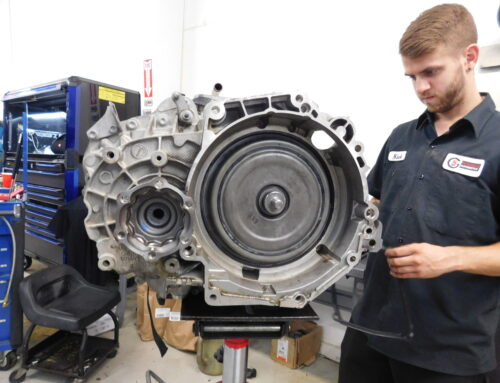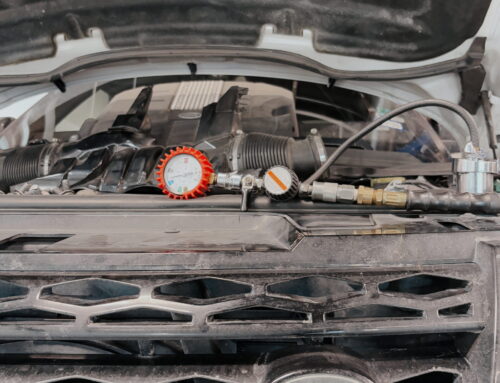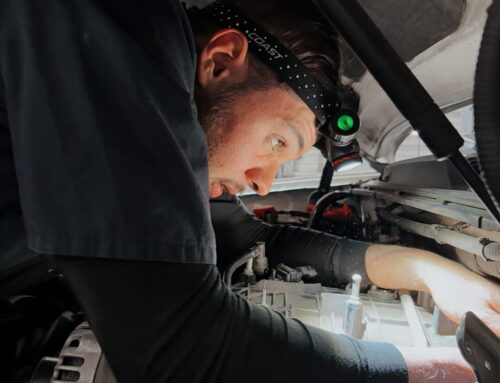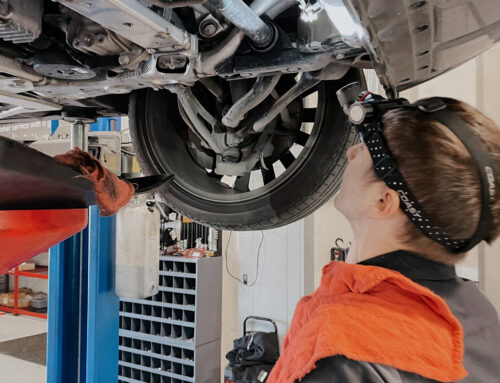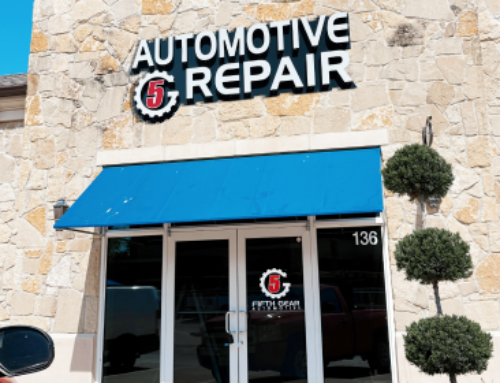When your vehicle experiences engine overheating, it can experience permanent damage. The best means of prevention is to pull over and shut the engine down as quickly as possible. Raising the hood will allow the engine to cool faster. If you are unable to pull over to a safe place immediately, run the heater, which acts like an extra radiator, and will help dissipate some of the heat in an overheated engine. This can assist you in reaching a safe place to pull the vehicle over. Bring your overheating vehicle in to Fifth Gear’s auto repair shops in Lewisville, TX for diagnoses of the cause and reliable auto repairs by our certified mechanics.
In addition, if the air conditioning is running, turn it off as it will increase the engine’s workload and the heat. Also, DO NOT remove the radiator cap on an overheated engine! This will result in scalding your face and neck with superheated steam and coolant. The best choice for an overheated engine is to pull off the road, and contact a wrecker service Fifth Gear Automotive auto repair shops in Lewisville, TX will be glad to assist you.
If you need to add coolant to the system, add it to the overflow if it is not pressurized. A pressurized overflow should have warnings on the cap, whereas a non-pressurized over will not. Treat a pressurized overflow cap as you would a radiator cap to avoid burns.
Furthermore, do NOT add cold water to a hot engine, damage can result if you do. When you are stranded and have nothing but the ice and melted water in a cooler, open the cooler, allow the ice to melt in the sun and the water to warm up. In a pinch water can be used to fill a leaking or low radiator once it has cooled. Distilled water is best to use due to the impurities in tap water, but when you have no other option water will suffice temporarily.
The important thing is to prevent further overheating. If you continue to drive without allowing the engine to cool, permanent damage is likely to occur.
Causes of an Overheated Engine
There are a number of potential causes behind an overheated engine:
- Low coolant level can be due to a leak. Checking the fluid levels every week can alert you a problem. It is advisable to check the fluid levels weekly of brakes, coolant, power steering and transmission (not all cars transmission fluid can be checked). If you note consistently low levels have your vehicle checked at Fifth Gear’s auto repair shops in Lewisville, TX.
- Inspection of the hoses can prevent overheating. Monitor hoses for leaks, splits, swelling and softening and have replaced if these signs of deterioration are detected. In addition, check clamps to ensure they are secure. Loose clamps can allow leakage in otherwise normal hoses.
- A stuck thermostat can cause overheating. For those auto owners with mechanical skills you can check the thermostat by removing it and placing it in boiling water. If it is operating it should open up when it reaches its operating temperature, typically from 180 degrees to 220 degrees. If it fails to open, it will need to be replaced. Always replace with a same threshold temperature thermostat to maintain fuel economy and proper engine operation.
- Radiator caps can be faulty or even allow leakage. The coolant expands as it reaches operating temperature, and the radiator cap allows expanded coolant to exit the system into the overflow tank. When the engine is shut off and cools the fluid reenters the system. Valves in the radiator cap control these functions, and if either fails, it can allow air to enter the system, which can cause intermittent overheating, or it allows the overflow tank to overflow and boil over, leaving the system low on coolant and running hot.
- For the same reason a cracked and leaking overflow tank should be replaced. Fifth Gear Automotive experienced technicians in our auto repair shops in Lewisville, TX can diagnose the exact cause of your overheating vehicle and provide the repair it needs.
- A faulty fan and/or faulty fan motor can result in overheating. If the fan is not operating on a hot engine bring it in to Fifth Gear’s auto repair shops in Lewisville, TX for replacement. Check the fan fuse in the fuse box, a blown fuse can prevent the fan from operating.
- Clogged radiators can cause overheating. Though not common, if a lot of stop leak products have been added to a leaking radiator clogs are more likely to occur. In addition, an engine that has sat for a lengthy time without driving is more prone to clogging. There are other causes of blockages and a professional radiator cleaning is the solution. For professional automotive repair, bring your vehicle to our auto repair shops in Lewisville, TX.
- Water pump failure can cause loss of coolant and overheating. The water pump is responsible for pumping coolant through the system, and when it fails overheating can occur quickly.
- Restricted exhaust causes overheating. A burned out and collapsed catalytic converter is one example of how a blocked exhaust can result in overheating of the engine. Fifth Gear Automotive auto repair shops in Lewisville, TX can take care of your vehicles exhaust problems for you.
- A blown head gasket, leaking intake gasket, cracked cylinder head or a cracked block are all potential causes of an overheated engine. They are a few of the internal leaks that may occur, and are not a typical DIY diagnosis, much less repair. Fifth Gear Automotive auto repair shops in Lewisville, TX will provide you with an accurate diagnoses, and offer solutions.
At Fifth Gear’s auto repair shops in Lewisville, TX our certified automotive technicians strive to exceed your expectations by providing the best quality automotive services available. For repair of issues related to engine overheating contact Fifth Gear Automotive today.


